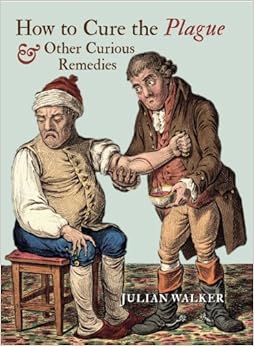So, are the old ways always the best? Well, sometimes they make sense even if you can't prove it. Then again, sometimes they don't.
Discover Magazine has an article on medical remedies in the old days, based on the book How to Cure the Plague. The author, Julian Walker, explores the science behind a wide range of history's cures. A couple are below - more at Discover.
Herbal Cough Syrup:
Then:
Take a pot of barley, and seethe it in a gallon of well-water, and let it seethe until the barley be lost; then strain it and put thereto as much new wort as of the aforesaid licquor, and put therein a good quantity of sage, and as much hyssop, and a pennyworth of liquorice well bruised; then seethe it again until it be half consumed away; then strain it and put it into a glass, or into some other close vessel, and so let it stand the space of one whole day, and let the party grieved drink two or three spoonfuls of it at a time, both morning and evening, and this will help him in a short space. This hath been well proved.
– A Rich Storehouse, or Treasurie for the Diseased, 1607
Now:
'Wort' is unfermented beer – the mix of grain and water, which would be soothing to drink; hyssop is a good expectorant, while sage has long been used against fevers. Liquorice’s soothing properties mean that it is still a common ingredient in cough medicines.
All-Purpose Pain Relief
Then:
[Wintergreen] boiled in wine and water and given to drink to them that have any inward ulcers in their kidneys or neck of the bladder, doth wonderfully help them; it stayeth also all fluxes, whether of blood or humours, [such] as the lask, bloody flux, women’s courses, and bleeding of the womb, and taketh away any inflammation rising upon pains of the heart.
– The English Physitian, Nicholas Culpeper, 1652
Now:
Oil of wintergreen, now obtained by distillation of the leaves, contains methyl salicylate, similar to aspirin, which is a longstanding treatment for cardiovascular conditions including heart attacks, acting as an anti-inflammatory and blood thinner.
And from the always fascinating Ask The Past, several more cures but without any modern equivalents given:
"A Medicine for the stopping of the nose and head, which commeth by reason of colde. Take a good quantity of the iuice of Primrose, and blow it with a quill into the Patients nose, and let him keep himselfe warme after it, and it will cleare both his head and nose."
A. T., A Rich Store-House or Treasury for the Diseased (1596)
 |
| Ambroise Paré, Opera chirurgica (1594) Ambroise Paré, Opera chirurgica (1594) |
How to Heal All Wounds, 1683
"A Drink that healeth all Wounds... Take Sanicle, Milfoil, and Bugle, of each a like quantity, stamp them in a Mortar, and temper them with Wine, and give the sick that is wounded to drink twice or thrice a day till he be whole: Bugle holdeth open the wound, Milfoil cleanseth the wound, Sanicle healeth it; but Sanicle may not be given to him that is hurt in the Head, or in the Brain-pan, for it is dangerous. This is a good and Tryed Medicine."
Hannah Woolley, The Accomplish'd Ladies Delight (1683)
How to Cure a Headache, 9th century
How to Stop Bleeding, 1664
"Headaches you will enchant: take some earth, touch your breast three times and say: My head hurts, why does it hurt? It does not hurt."
Pseudo-Pliny (9th century)
“To Stench a Bleeding Wound: Lay hogs Dung, hot from the Hog, to the Bleeding Wound.”
Samuel Strangehopes, A Book of Knowledge in Three Parts (166[4])
Previous posts:
Advice from 1380: How to Tell if Someone Is or Is Not Dead, with bonus Monty Python.

If you are getting breast implants you may be thinking about going for cheap Breast implant Delhi.
ReplyDelete